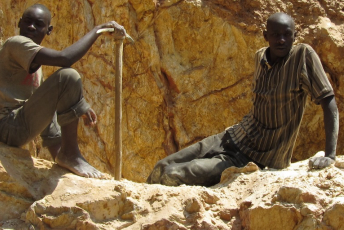The Democratic Republic of the Congo (DRC) is the world’s leading cobalt producer, contributing around 70% to global production. However, complex levels of organised crime occur along the supply chain of this strategic mineral from the DRC, including illegal mining, smuggling and collusion between illegal miners, organised criminal gangs and state-embedded actors involved in its extraction and trade.
Cobalt plays a crucial role in powering modern technology. It is used to produce lithium-ion batteries, which are integral to electric vehicles, computers and smartphones. With the increasing shift towards renewable energy sources, there is a massive demand for these batteries. Global demand for cobalt is projected to quadruple by 2030, primarily driven by the widespread adoption of electric vehicles.
There are at least three ownership and operation levels for cobalt mining in the DRC. In 2019, the government granted the Entreprise Générale du Cobalt (EGC, or General Cobalt Company) the monopoly to acquire, process and market all artisanal cobalt produced in the DRC.
It also established the Authority for the Regulation and Control of Strategic Mineral Substances Markets, which oversees and manages the production and export of strategic minerals considered crucial to the country’s economic and national security.
Lastly, multinational corporations launched emerging responsible cobalt sourcing programmes aimed at mitigating supply chain risks by formalising artisanal cobalt production.
Despite these measures, the state lacks the capacity to monitor and enforce compliance, so mining licensees (both local and foreign) have the latitude to operate outside the rules of engagement.
Many foreign companies with mining licences do not produce the Congolese cobalt themselves, due to the country’s instability and volatility. Rather, they source cobalt through artisanal miners. Around 150 000 to 200 000 artisanal miners mine cobalt deposits in the DRC. Another million people depend on the income from artisanal cobalt mining. Artisanal miners play an especially significant role in extracting cobalt in the Kivu and Katanga provinces.
The Mining Code stipulates that any adult DRC citizen wanting to participate in the artisanal extraction of mineral resources must be a member of an authorised mining cooperative. To join such a cooperative, one must hold an artisanal mining permit. These permits are provided once the miners have completed a formal registration process.
However, many artisanal miners lack the essential permits required for their activities, a senior environmental advocate who requested anonymity told ENACT. Although this renders them illegal miners, they do not see their mining activities as unlawful as they believe the minerals are rightfully theirs.
Artisanal cobalt miners tend to occupy mines in remote territories because these are more difficult for the state to access and control. Artisanal miners from surrounding communities sometimes buy protection (in cash or minerals) from the armed groups who control these isolated mines so they can extract the mineral. In addition, the miners sometimes sneak into the sites at night to engage in illicit mining, sources told ENACT.
The amount of cobalt extracted from these inaccessible sites is largely unaccounted for and is impossible to trace. It is funnelled into the licit global supply chain through corruption and smuggling.
The cobalt extracted from unauthorised sites is often brought to authorised sites for Congolese Ministry of Mines certification. This is enabled and regularly committed by official omission or collusion. Due to corruption, insufficient regulation and lack of government oversight these practices along the supply chain from artisanal miners to multinationals are difficult to track.
While the presence of soldiers and police in mining areas is forbidden by law (due to global certification requirements designed to prohibit blood or conflict minerals), the informality of mining operations in remote locations encourages their participation. Environmental advocates and civil society actors in Goma and Bukavu told ENACT that law enforcement officials visited sites at night to illegally obtain cobalt from artisanal miners, which they resold for profit. This reportedly also happens regularly in South Kivu.
Cobalt smuggling is also aided by corruption at the DRC’s borders with Zambia, Burundi and Tanzania where poorly paid security officials are easily bribed. Border police reportedly know which vehicles are used by smugglers, and then turn a blind eye in exchange for a bribe, according to industry observers in Goma. Soldiers and border law enforcement officers are also known to provide security for smugglers conveying cobalt to neighbouring countries.
Mineral smugglers devise ingenious means to remove cobalt from the DRC, sometimes presenting forged traceability and certification documents to border officials.
The illegal exploitation of cobalt harms the local population and the environment. Workers often do not wear protective masks, and inhaling high levels of cobalt can result in serious health issues, including cancer, respiratory diseases and heart problems. Paternal exposure to cobalt and mining by-products from occupational mining is the factor most strongly associated with birth defects in the DRC’s mineral-rich communities. Cobalt mining also leads to toxic dumping that destroys landscapes, pollutes water and contaminates crops.
This illegal cobalt production also results in massive revenue loss for the country. In 2023, Finance Minister Nicolas Kazadi stated that the country lost almost US$1 billion a year in minerals illegally smuggled into Rwanda alone. This bodes ill for the country’s economy and represents a missed opportunity to enrich the state treasury, with a view to alleviating poverty and enhancing development outcomes.
Policies are urgently needed to address the challenges identified in the DRC’s mineral-rich regions. These include reforming the regulation of the artisanal mining sector, bolstering security and law enforcement along the cobalt supply chain, and improving mineral traceability.
In 2021, the government of the DRC indicated its desire to process raw materials domestically. It is currently working with the Zambian government to create a specialised economic zone where raw materials can be transformed into preliminary products for the battery supply chain. Vuko Ndondo Kakule, the deputy executive director of the Congolese Battery Council, noted that the DRC aims to become one of the world's leading battery producers by 2030 or 2040.
In the meantime, the state must match this aspiration with action by pursuing robust development and mining programmes for vulnerable populations in isolated communities where illegal cobalt mining and trading are rife. This would help to create new jobs in the energy market and improve community members’ participation in the extractive sector by offering assurance for the protection of their market share of the mining trade.
The government should address border corruption among security officials by simplifying and harmonising procedures, encouraging the use of new technologies, and focusing on organisational and institutional development by improving border officials’ welfare.
Civil society can expedite the training of observatory groups at the local level to monitor, document and submit incident reports on cobalt mining sites. With the existing International Tin Supply Chain Initiative drawing criticism for faulty processes that allow the laundering of tainted minerals in the DRC, a home-grown initiative managed by organised civil society becomes pivotal. This would help provide a shadow report to validate or invalidate traceability and certification audits by state officials and current schemes by international players in the mining industry.
Oluwole Ojewale, Regional Organised Crime Observatory Coordinator – Central Africa
Image: Fairphone/Flickr







